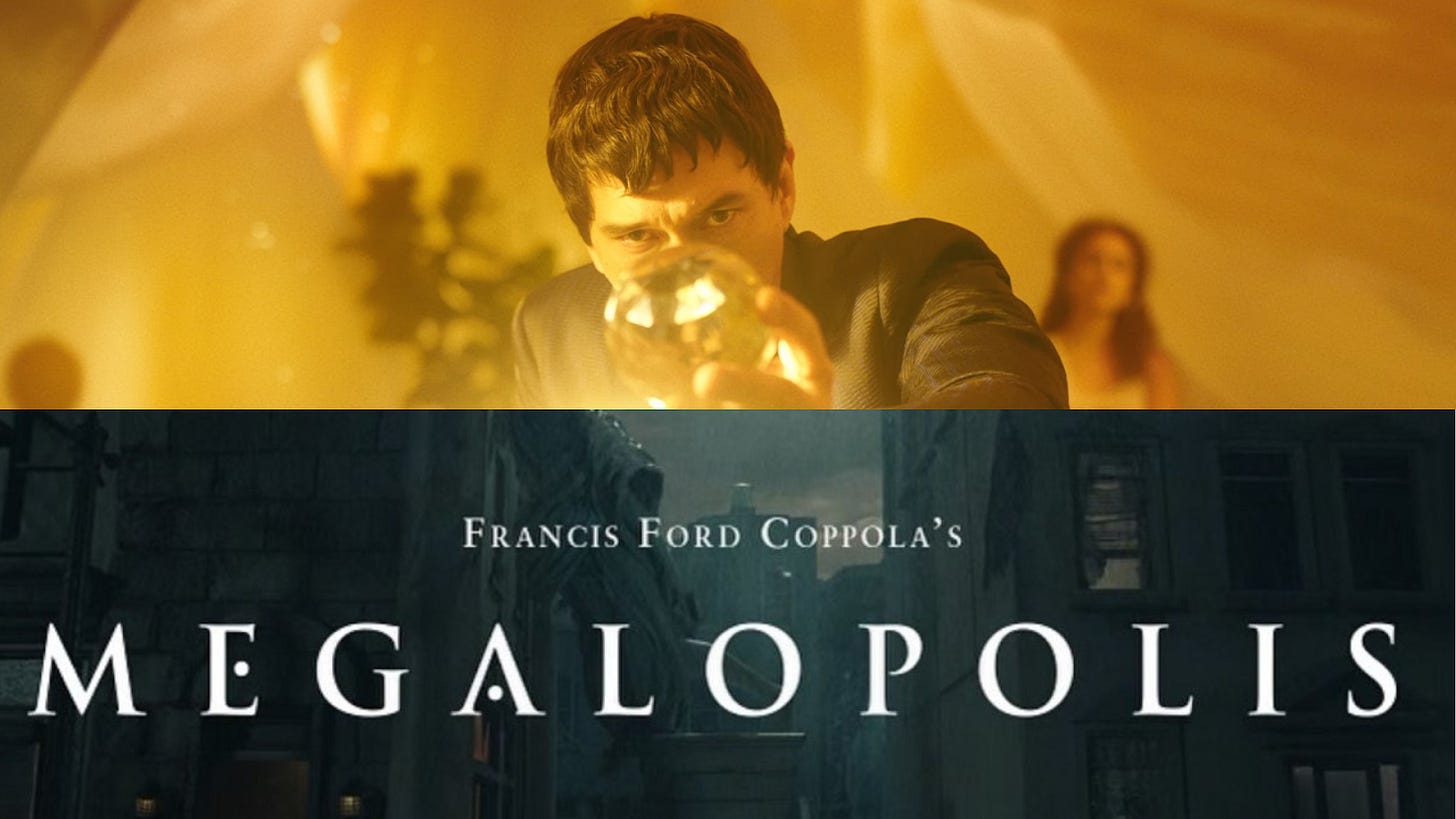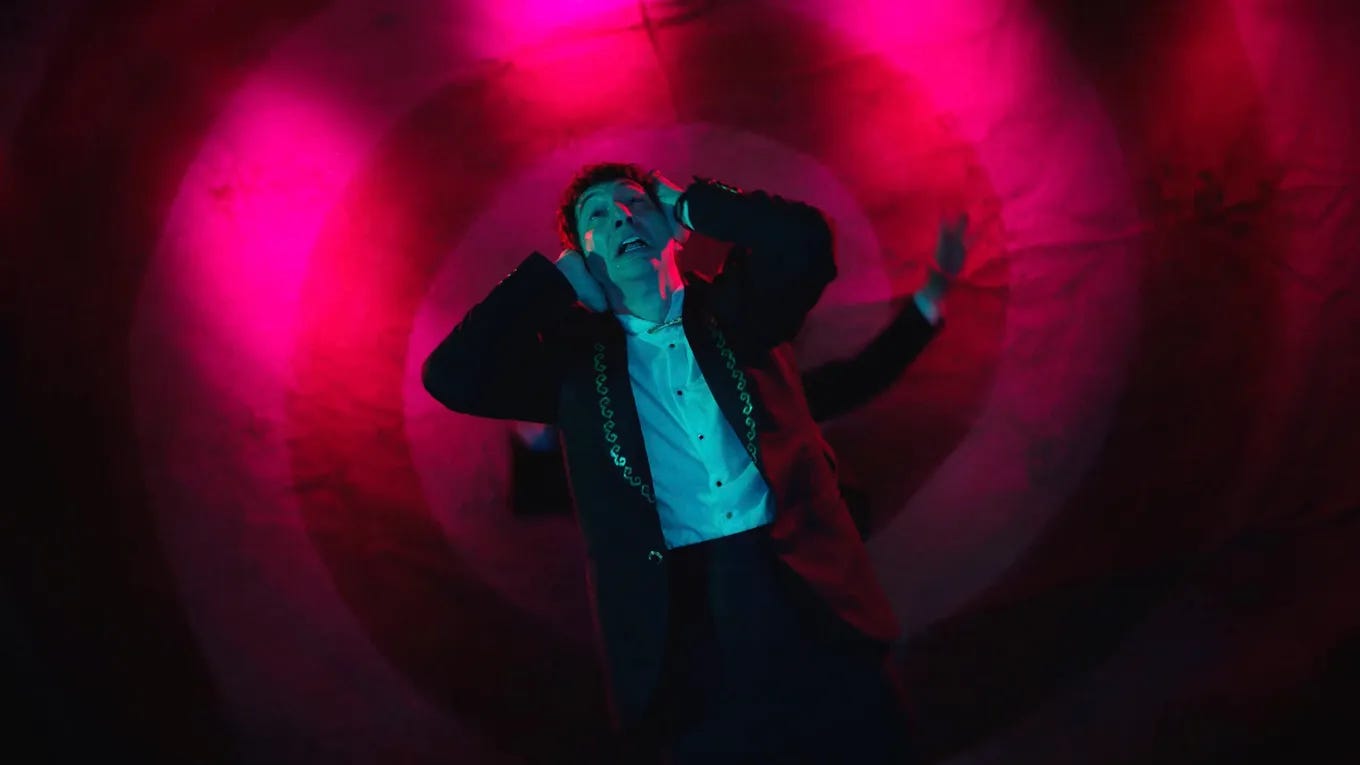Cannes 2024: 'Megalopolis' Review
Well at least he made 'The Godfather'
No spoilers
It brings me no joy to report that Francis Ford Coppola’s torturously wrought dream project, Megalopolis, is a hot mess. I could not believe my own eyes, as the images and words failed to synch with how I conceive of the director of Apocalypse Now and The Godfather.
I was among the first to see the film, ahead of even the true premiere, as the press screening took place a few hours prior to give journalists and critics the chance to formulate their reviews.
Up to this point, I’ve tried to read as little about the film and see as few clips or trailers as possible. I had an open mind, no matter how many times Matt Belloni has pilloried the film in his Puck newsletters or how many Film Twitter bros have made Megalopolis their personality sight unseen.
I knew we were in trouble from the jump, as embarrassing title cards that belong in a 6th grader’s PowerPoint flashed on screen. It just got wackier from there, as the entire cast—a head-spinning array of stars and yester-stars—engaged in spirited debate—that is, until Adam Driver broke the air by performing Hamlet.
I don’t even want to get into the plot, but here’s the gist: In the orgiastic, decaying gotham of New Rome, we’re introduced to a rivalry between a brilliant but brooding architect, Caesar Catilina (Driver), whose visions of development clash with the establishment, personified by Mayor Franklyn Cicero (Giancarlo Esposito). Further splitting them up is a budding Romeo and Juliet affair between Cicero’s daughter Julia (Nathalie Emmanuel) and Caesar.
This sounds straightforward enough, but Megalopolis is anything but. The 85-year-old Coppola has filmmaking and storytelling ADHD. We zip around at such a breakneck pace, never being able to work through our whiplash and get a proper handle on the overstuffed story and its many characters.
The dialogue is heightened and unnatural, and every line delivery plummets like a lead balloon. Emmanuel is particularly unconvincing, but not much better are the random inclusions of actors like Jon Voight, Shia LaBeouf, and Dustin Hoffman—end-of-the-line performers not working for certain reasons. Aubrey Plaza seems to be the only one having fun.
As for Driver, my god, how many ancient directors till he’s had his fill? Between this Ferrari, House of Gucci, and The Man Who Killed Don Quixote, he’s collecting old masters like infinity stones. It’s both admirable and misguided.
I’m attempting to be measured, but here’s a peek behind the curtain of my process. All my notes from the film are variations of WTF, but here are some choice gems: “This is so bad,” “get me out,” “headache,” “everyone needs to fire their agent,” “I’d walk out if not for FFC,” “nausea,” “woof,” “please end.”
Megalopolis nose-dives in a gladiatorial sequence—the centerpiece of the film—that was shot so dizzyingly as to induce queasy vertigo. There are thrilling on-screen fever dreams, and then there’s this: something so awful that it makes you physically ill.
I can’t recommend anything within this film, even as it takes aim at fascinating genres and themes including politics, Shakespeare, the Roman Empire (don’t even ask the viral question; Coppola might think about the SPQR every single minute…), metropolises, and conspiracies. But the approach is so scattershot and somehow both amateurish and pretentious at the same time.
To preserve some surprise (if you dare give over 138 minutes of your time), I won’t highlight the myriad head-scratching moments, but I’ll say that this is more likely to become a midnight spoon-throwing cult-classic a la The Room than an Oscar hopeful. By the final hour, my audience (including myself) was audibly guffawing, unable to comprehend how to take what we were hearing and seeing seriously.
Plots start up and have no resolution. Character arcs go unresolved. Any unique ideas or sincere emotionality trying to be conveyed doesn’t stand a snowball’s chance in hell when the foundation, the basic building blocks of story and character that Coppola knows (or knew), is so shaky, ironic for a film that is about building.
Two of last year’s films, from aging auteurs, flashed in my mind as I fought back tears of boredom and debilitating motion sickness: Hayao Miyazaki’s The Boy and the Heron and Martin Scorsese’s Killers of the Flower Moon. Both of these films are wildly ambitious and deeply personal to their aging directors, yet each still managed to engage on its own terms successfully. I’m afraid the same can’t be said for Megalopolis.

Critics are doing mental jiu-jitsu, bending over backwards to praise the film, saying it breaks cinema wide open, challenging and stimulating us on intellectual and physical levels. They’re right in a way; I’m intellectually and physically challenged by what to make of this film and its legendary director flopping so hard.
I should’ve known last year after reading Sam Wasson’s pseudo-biography of Coppola, specifically about the making of Apocalypse Now. Wasson was properly reverent of the titan, but as Coppola articulated the 40-year-in-the-making Megalopolis, it was a complete word salad.
But I sincerely hope Francis is happy, and whatever he needed to work through got worked through. $125 million is a massive therapy bill, but only he knows if this has brought him eternal peace. It brought me, on the other hand, tremendous agita.









